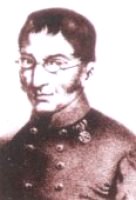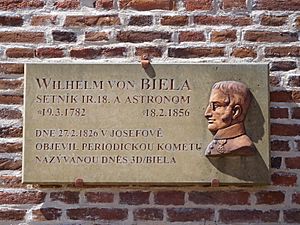Wilhelm von Biela facts for kids
Quick facts for kids
Baron Wilhelm von Biela
|
|
|---|---|
 |
|
| Born | March 19, 1782 |
| Died | February 18, 1856 (aged 73) |
| Nationality | German, Austrian |
| Known for | Biela's Comet |
Baron Wilhelm von Biela (born March 19, 1782 – died February 18, 1856) was a German-Austrian military officer who also loved studying the stars. He became a famous amateur astronomer, which means he studied astronomy as a hobby, not as his main job. He is best known for discovering a special comet called Biela's Comet.
Contents
Early Life and Military Career
Wilhelm von Biela was born in a town called Roßla in northern Germany. His family was a noble family from what is now the Czech Republic.
After studying at a military college, Biela joined the Austrian army in 1802. He served as a cadet, which is a trainee officer. He worked his way up to become a captain of Grenadiers, who were special soldiers known for throwing grenades.
Biela fought in several wars against Napoleon. In 1813, he was an Adjutant (a military assistant) to a general during the Battle of Leipzig, where he was injured.
From Soldier to Stargazer
In 1815, Biela went to Prague and started studying astronomy with a teacher named Martin Alois David. Later, he served in Italy and became the commandant (the officer in charge) of the town of Rovigo.
Even though he was a military officer, Biela spent a lot of his time looking at the sky. He was especially interested in comets.
Discoveries in Space
Wilhelm von Biela loved watching and figuring out the paths of comets. He also observed sunspots, which are dark spots on the Sun's surface.
He wrote many articles about comets and other space topics for a science magazine called Astronomische Nachrichten. He even wrote about the idea of comets "falling into the Sun."
Biela found two comets that other astronomers had already seen. But his most important discovery was a comet that no one else had found yet. This comet was named Biela's Comet after him. It was a "periodic comet," meaning it returned to our part of the solar system regularly.
Amazingly, Biela's Comet later split into two pieces and then completely broke apart! This was a very exciting event for astronomers.
Legacy
Not much is known about Biela's personal life, but we know he was married and had a daughter.
In the 1840s, Biela retired and moved to Venice, where he passed away in 1856.
To honor his work, a crater on the Moon is named Biela. Also, a small planet, called 2281 Biela, is named after him.
See also
 In Spanish: Wilhelm von Biela para niños
In Spanish: Wilhelm von Biela para niños
 | Percy Lavon Julian |
 | Katherine Johnson |
 | George Washington Carver |
 | Annie Easley |


